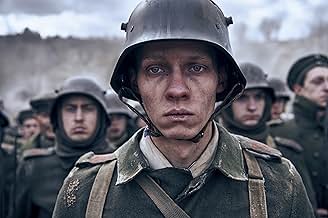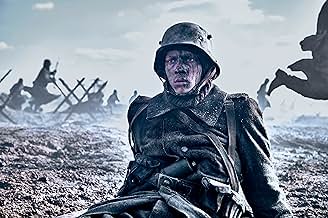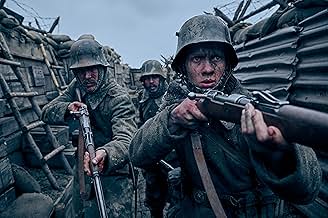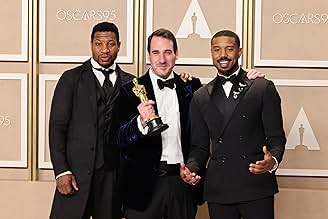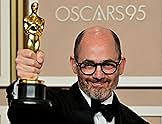Die grauenvollen Erlebnisse und das Elend eines jungen deutschen Soldaten an der Westfront während des Ersten Weltkrieges.Die grauenvollen Erlebnisse und das Elend eines jungen deutschen Soldaten an der Westfront während des Ersten Weltkrieges.Die grauenvollen Erlebnisse und das Elend eines jungen deutschen Soldaten an der Westfront während des Ersten Weltkrieges.
- 4 Oscars gewonnen
- 59 Gewinne & 89 Nominierungen insgesamt
Empfohlene Bewertungen
Never expected a netflix movie to shake me to my core but this film kept me frozen in my seat even after a few minutes into the ending credits. It made me think about war and what it does to people. Just as the book had done. But this time due to the superb acting, marvelous cinematography and flawless direction that feeling will stay with me for a long time. They took a great desicion by using an all German cast which made it feel ever more real. And the way they made me feel connected to the charecters. I mourned each one of them and kept praying for the movie to be war soon ,so they could get a happy ending.
This movie did something I didn't expect from a World War movie...it makes you feel empathetic for the Germans. To an extent.
I'm no war buff so I'll leave the realism to the experts but what this movie does is show you the first World War from the view point of people who've never experienced or even conceived of war and bloodshed on this scale. It starts off with new recruits full of patriotism for their country expecting to be sent on a grand adventure only to have those expectations quickly shattered. Turns out war isn't fun, and not even initially due to the actual fighting. Just training and constantly being screamed at and controlled while marching your days away is brutal. Remember, while vehicles existed, they weren't common use at this period of time...these soldiers had to walk, walk, and walk some more to get to where the war effort was taking place. And even if they had vehicles most of those places didn't have roads yet to drive them on. Then there's the constant lack of food and water, rough sleeping conditions, being exposed to the elements. Just GETTING to the war is brutal. That's a good 3rd of the movie right there.
Then close to the half way point, after a few minor skirmishes, we see the war front and the trenches and get to see what that's like. Well...it's terrible! You pop up out of a trench and boom...you're shot. And that's just life in between charges. There was no strategy to the charges either, they relied on waves of bodies to gain even 100 meters, hoping to out pace the bullets constantly coming your way. Millions of young men died in this fashion, their bodies littering the field.
The most brutal part of the film is the weapons of war never before seen. Tanks, flame throwers, planes dropping bombs. Men screaming in pure terror while the bullet proof tanks drive over them, while flames fill their trenches, or planes blow them up while they flee.
And the odd thing is since we're seeing it from the eyes of the young German soldiers, who are truly clueless as to why they're really even fighting, you do empathize and feel sorry for them. You find yourself even rooting for them. This movie humanizes them but importantly shows the politicians who are truly to blame for the atrocities. The powerful men behind the scenes, bloated from being overfed on rich foods, hundreds of miles away from the pain and suffering they cause.
I have no idea how accurate this movie is but it's a pretty straight forward piece showing just how awful, terrifying, and destructive this period of time was. I really enjoyed it and recommend it to any fans of this genre.
I'm no war buff so I'll leave the realism to the experts but what this movie does is show you the first World War from the view point of people who've never experienced or even conceived of war and bloodshed on this scale. It starts off with new recruits full of patriotism for their country expecting to be sent on a grand adventure only to have those expectations quickly shattered. Turns out war isn't fun, and not even initially due to the actual fighting. Just training and constantly being screamed at and controlled while marching your days away is brutal. Remember, while vehicles existed, they weren't common use at this period of time...these soldiers had to walk, walk, and walk some more to get to where the war effort was taking place. And even if they had vehicles most of those places didn't have roads yet to drive them on. Then there's the constant lack of food and water, rough sleeping conditions, being exposed to the elements. Just GETTING to the war is brutal. That's a good 3rd of the movie right there.
Then close to the half way point, after a few minor skirmishes, we see the war front and the trenches and get to see what that's like. Well...it's terrible! You pop up out of a trench and boom...you're shot. And that's just life in between charges. There was no strategy to the charges either, they relied on waves of bodies to gain even 100 meters, hoping to out pace the bullets constantly coming your way. Millions of young men died in this fashion, their bodies littering the field.
The most brutal part of the film is the weapons of war never before seen. Tanks, flame throwers, planes dropping bombs. Men screaming in pure terror while the bullet proof tanks drive over them, while flames fill their trenches, or planes blow them up while they flee.
And the odd thing is since we're seeing it from the eyes of the young German soldiers, who are truly clueless as to why they're really even fighting, you do empathize and feel sorry for them. You find yourself even rooting for them. This movie humanizes them but importantly shows the politicians who are truly to blame for the atrocities. The powerful men behind the scenes, bloated from being overfed on rich foods, hundreds of miles away from the pain and suffering they cause.
I have no idea how accurate this movie is but it's a pretty straight forward piece showing just how awful, terrifying, and destructive this period of time was. I really enjoyed it and recommend it to any fans of this genre.
In the excellent 1930s original, war is seldom better summarised than by: 'It's dirty and painful to die for your country, when it comes to dying for your country it's better not to die at all. There are millions out there dying for their countries, and what good does it do?'.
It's a statement that applies just as well today, and complimented by this outstanding piece of film making too, which leaves us under no illusions of man's inhumanity to man. The performances are truly incredible, the technical achievement recreating scenes of war outstanding, and the messages as clear as any about the futility of armed combat and the inability of the human race to learn its lessons - even to this day. Not really a film to enjoy, but certainly a film to reflect on how far we haven't come since 1918, especially in a world that often seems so intent on pulling itself apart.
It's a statement that applies just as well today, and complimented by this outstanding piece of film making too, which leaves us under no illusions of man's inhumanity to man. The performances are truly incredible, the technical achievement recreating scenes of war outstanding, and the messages as clear as any about the futility of armed combat and the inability of the human race to learn its lessons - even to this day. Not really a film to enjoy, but certainly a film to reflect on how far we haven't come since 1918, especially in a world that often seems so intent on pulling itself apart.
Just got off watching this Netflix version of the classic.
I vaguely remember the 1979 version with Ernest Borgnine (7/10) and I certainly remember watching the original 1930 film. Both powerful in their own ways. The 1930 film is the best of the three - with first class black & white photography, and all done in that particular way of German story telling. In 1930, the events were very recent - just 13 years previous. Every male over age 30 in German cinemas would have had direct experience. It must have been awful for those audiences to watch the apocalyptic battlefield scenes - still some of the most graphic and numbing ever filmed. My rating 8/10.
So how does this one from Netflix in 2022 stand up then? Well sadly, not that tall.
It's bleak, graphic, actually depressing. An assault on the senses. Sure - it really conveys the impression of the horrors and desperation of trench warfare. But that's all. Maybe that's all it's supposed to do? Maybe that's, as a matter of fact all there was: mayhem and horror? There's nothing to redeem it. Again - that's the point: there's nothing good or glorius about war. Only the opposite.
The men who went to war then, as now, are not all evil men bent on barbarism and terror. All Quiet on the Western Front (all versions) shows us that those who go to war are just normal people - people like you and me. Good people go to war. Normal people. They end up having to see terrible things, do terrible things, to kill or be killed. That's the stark reality. This film certainly shows us that, but there is no upside, no redemption. There are little glimpses of humanity in the friendships, but that's all.
I vaguely remember the 1979 version with Ernest Borgnine (7/10) and I certainly remember watching the original 1930 film. Both powerful in their own ways. The 1930 film is the best of the three - with first class black & white photography, and all done in that particular way of German story telling. In 1930, the events were very recent - just 13 years previous. Every male over age 30 in German cinemas would have had direct experience. It must have been awful for those audiences to watch the apocalyptic battlefield scenes - still some of the most graphic and numbing ever filmed. My rating 8/10.
So how does this one from Netflix in 2022 stand up then? Well sadly, not that tall.
It's bleak, graphic, actually depressing. An assault on the senses. Sure - it really conveys the impression of the horrors and desperation of trench warfare. But that's all. Maybe that's all it's supposed to do? Maybe that's, as a matter of fact all there was: mayhem and horror? There's nothing to redeem it. Again - that's the point: there's nothing good or glorius about war. Only the opposite.
The men who went to war then, as now, are not all evil men bent on barbarism and terror. All Quiet on the Western Front (all versions) shows us that those who go to war are just normal people - people like you and me. Good people go to war. Normal people. They end up having to see terrible things, do terrible things, to kill or be killed. That's the stark reality. This film certainly shows us that, but there is no upside, no redemption. There are little glimpses of humanity in the friendships, but that's all.
This is not strictly-speaking an adaption of Erich Maria Remarque's classic. A few minor incidents from the novel are included, but Remarque's biggest contribution to this film is the title. Given the ending of the film (as opposed to the book) the title is somewhat misleading, but it's such a classic that the film-makers' decision is quite understandable.
This is a brutal and uncompromising study of the realities of war. The fact the the war depicted took place more than a hundred years ago doesn't make it any less relevant. It could be shown in Ukraine today, and soldiers on both sides would understand.
Nor is the film's anti-war message terribly new. It is, however, a message that needs to be repeated over and over again, until (maybe) enough people take it seriously.
The battle scenes are appallingly visceral - possibly the best of their type since the opening of Saving Private Ryan.
The history of any war is written by the winners, but that doesn't stop them being a tragedy for the poor grunts on the losing side as well.
This is a brutal and uncompromising study of the realities of war. The fact the the war depicted took place more than a hundred years ago doesn't make it any less relevant. It could be shown in Ukraine today, and soldiers on both sides would understand.
Nor is the film's anti-war message terribly new. It is, however, a message that needs to be repeated over and over again, until (maybe) enough people take it seriously.
The battle scenes are appallingly visceral - possibly the best of their type since the opening of Saving Private Ryan.
The history of any war is written by the winners, but that doesn't stop them being a tragedy for the poor grunts on the losing side as well.
Wusstest du schon
- WissenswertesErich Maria Remarque's book was inspired by his own experiences as a German soldier in World War I. Remarque fought in the trenches and the novel is notable for its realistic depiction of the horrors of battle, and the trouble soldiers face during and even after the fighting.
- PatzerBy the end, Germany's delegation to Rethondes appears indignant as the terms and conditions of armistice are quoted by Mathias Erzberger, namely forfeiting submarines, planes, weapons and so on; what is read there was not in the November 11, 1918 capitulation act but was imposed upon Germany next year in the Treaty of Versailles.
- Zitate
Matthias Erzberger: All that's left separating us from an armistice is false pride.
- VerbindungenFeatured in Business Now: Folge vom 19. Oktober 2022 (2022)
- SoundtracksEbben? Ne andrò lontana ('La Wally', Act 1)
Written by Alfredo Catalani and Luigi Illica
Performed by Maria Luigia Borsi
Top-Auswahl
Melde dich zum Bewerten an und greife auf die Watchlist für personalisierte Empfehlungen zu.
Details
- Erscheinungsdatum
- Herkunftsländer
- Offizieller Standort
- Sprachen
- Auch bekannt als
- Sin novedad en el frente
- Drehorte
- Produktionsfirmen
- Weitere beteiligte Unternehmen bei IMDbPro anzeigen
- Laufzeit2 Stunden 28 Minuten
- Farbe
- Sound-Mix
- Seitenverhältnis
- 2.39 : 1
Zu dieser Seite beitragen
Bearbeitung vorschlagen oder fehlenden Inhalt hinzufügen





